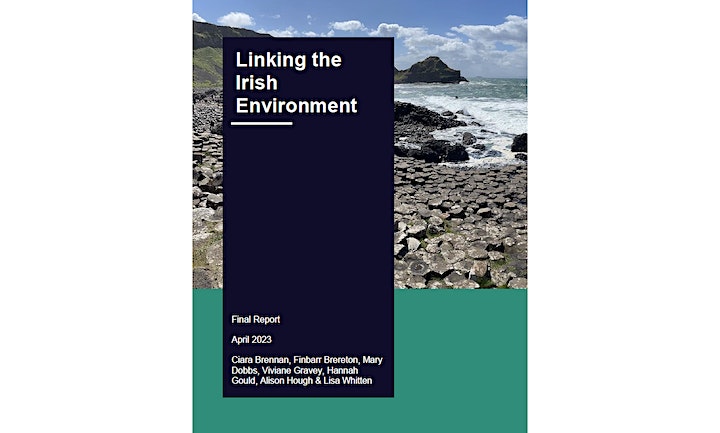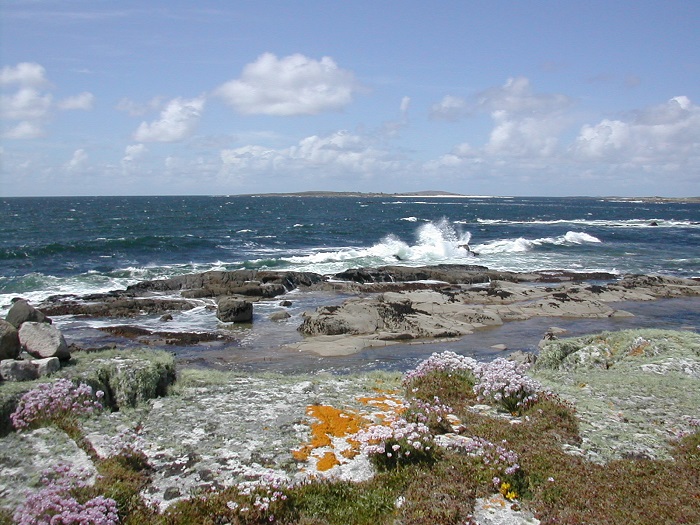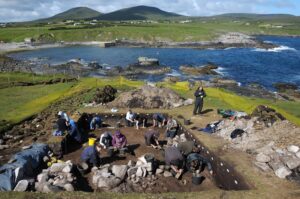Following the launch of the ‘Linking the Irish Environment‘ report, talking to Dr Finbarr Brereton about north-south environmental governance, how the environment intersects with economics, and his interest in subjective well-being

Q: Let’s start with the Linking the Irish Environment report that you’ve been working on with colleagues in the Republic and Northern Ireland. What kind of environmental issues are facing the island of Ireland? Do these challenges require a bottom up or top-down approach?
The report was launched at on 21 June 11am-3.10pm with a special seminar. Linking the Irish Environment: Report Launch and Special Seminar
A: One key problem is that we already had the strongest top-down environmental protection in the world prior to Brexit. Between the two, Northern Ireland and the Republic, we had European Union environmental policy governing both sides of the border, and of course the UK which also comes into play as well. What did that mean? Did it mean absolute equivalence of regulations and implementation across borders? No. The best way to put it is probably similar but not the same. But at least there was a level playing field, you know what was happening on both sides of the borders because you had this overarching supranational framework.
What’s happening now is you have the potential for deviation in environmental standards. In fact it’s already starting to happen. After Brexit, what we now have in the UK including Northern Ireland is Retained European Union Law, which is European Union Law that no longer applies particularly in the UK. In Northern Ireland it’s very strange, what is happening – some areas are completely covered under the NI Protocol, so are still subject to European Union Law, still subject to the European Court of Justice, like the REACH Directive for instance. Some are partially covered by the EU and UK law, and some are completely outside. In terms of the removal of control of EU law, two of the most important are the Birds and Habitats Directives.
This is one of the things we highlight in the report: the importance of the European Union for maintaining high environmental quality. It’s absolutely essential. It’s hard to overemphasise. It’s the strongest environmental protection you have in the world for transborder environmental issues. The environment doesn’t stop at borders. Environmental amenities, both good such as air quality and poor for instance pollution, don’t stop at a border.
The potential, and it still is potential, is for regression in environmental standards to happen in the UK or Northern Ireland. I’ve been working on this report with colleagues in the North. They’ve already pointed out that there’s water pollution affecting the Republic of Ireland from an intensification of poultry farming post Brexit. I guess the problem is that the strongest protection was already there. We’re going to end up with something that’s weaker. The top-down element of it unfortunately has regressed and more than likely will regress further.
Where will we end up? I guess that is where the environmental NGOs and stakeholders come in, lobbying governments. Even that in itself has become much more complicated. If you are an environmental NGO in Northern Ireland or the Republic you went to Brussels and you lobbied the environmental agencies, DG Environment, environmental ministers, because that’s really where all the decisions are made, most of them anyway. But now, you need to go to Brussels and you need to go to Stormont, and you need to go to Westminster. The laws are diverging in terms of the environmental rules governing the two areas, north and south but the avenues for stakeholder involvement are also diverging.
“This is one of the things we highlight in the report: the importance of the European Union for maintaining high environmental quality. It’s absolutely essential. It’s hard to overemphasise. It’s the strongest environmental protection you have in the world for transborder environmental issues. The environment doesn’t stop at borders. Environmental amenities, both good such as air quality and poor for instance pollution, don’t stop at a border.”

Q. Does this make things more difficult for stakeholders to make their case?
A. Absolutely. It’s going to become more difficult. In terms of funding – if you’re a small environmental NGO and you want to engage with your counterparts in Northern Ireland, there used to be Interreg, there used to be Cohesion funds, there used to be EU funds to support that. But the UK are now out of that. It’s no longer available to NI entities other than Peace Plus.
The lead author on the report, Ciara Brennan, is the Director of Environmental Justice Network Ireland, based in Northern Ireland. They want to see themselves as an all-island body but they’re facing two currencies. Okay that was the situation before Brexit but they’re now potentially facing two different regulatory environments as well, and not just that, different regulatory environments covering different environmental issues. If you’re looking at REACH, covering chemicals etc, that’s still European Union law, if you’re looking at Birds and Habitats, that’s UK law, that’s retained. The minister now has the ability to change the law, to retract Special Areas of Conservation, Special Areas of Protection.
Q: Have any Special Areas of Conservation (SACs) been retracted in Northern Ireland, for example?
A: Not yet, and this is where it potentially becomes much more uncertain, because it depends on the minister of the day. This is the big worry in the UK. For example, as was pointed out by Andrew Jordan, one of the main people who works on EU Environmental law and Brexit, something like the Nitrates Directive could see very heavy lobbying by farmers in the UK to be repealed, because it’s very expensive for farmers to implement. So suddenly you have very powerful lobbying bodies, not just farmers of course, but that are lobbying a minister that they know has the power to change the law with the stroke of a pen. Whereas before, prior to Brexit, you couldn’t do that, you had to go through the European channels, your partners had to agree, you had to get a certain amount of member states to agree to these changes. It was very difficult to get a regression of environmental standards through the European Union, once the law is made it’s almost impossible to lower standards.
Q: Was Brexit the impetus for writing this report?
A: I think the main rationale was that the Irish Environmental Network, an umbrella body of environmental NGOs in the Republic, and the Northern Ireland Environment Link – they were already finding it difficult to cooperate, and this was with similar EU regulations across borders and availability of funding north and south of the border. What they wanted was to see would that level playing field of EU regulation change post Brexit, how would different environmental issues be governed? Are there any other opportunities for collaboration north and south?
This is where one of the co-authors of the report, Alison Hough, maintains that the Good Friday Agreement is under-utilised as a document for cross-border cooperation. It was underutilised because it wasn’t really needed since the UK and Ireland were both within the EU. She would argue that the GFA is now becoming very important. It has for example North-South ministerial committees, ministers from both the assembly and the Dáil working together, but when you don’t have an administration, it’s very difficult.
Q: What needs to happen to make things work, to protect the environment on an all-island basis?
A: Unfortunately, it’s going to have to be somewhat driven by these grassroots entities, by the NGOs themselves, because the formal mechanisms can’t do it alone. There is the Aarhus Convention which guarantees access to information, and for example input into decision making but how it’s applied, and its administration on both sides of the border can differ hugely. If you transgress in terms of EU laws, there’s a very clear process for bringing countries back. In the Aarhus convention it’s a much different process, it’s unclear what the consequences are for digression from the convention.
To give you an example of the Northern Irish context, EJNI now need two separate employment contracts to hire north and south of the border. They need legal expertise dealing in law. You’d need a PhD to understand what’s going on in Northern Ireland in relation to environmental law, but not just Northern Ireland. Westminster drafted the NI Protocol Bill which was to unilaterally give power to Ministers of the Crown to repeal certain elements of the NI Protocol. There’s also EU Retained Law. Then within Great Britain & UK itself there’s the devolved institutions. NI has separate powers to Scotland, England and Wales, governing different issues. It’s difficult for a small NGO to know where to start. Take water quality, what’s going to replace river basin management across the Island of Ireland? That’s out of the Protocol. The Protocol, in terms of what it governs environmentally, is really things related to trade and investment. They are the main things.
Q: There are a lot of legal and policy aspects to this – have you always combined this with economics in your work?
A: I guess we didn’t need to be as ingrained in what was going on legally because there was one body of law. The EU is not perfect, but it was quite coherent, it was quite clear where the avenues were, how to input into the policy process etc. This is one of the complaints by the NGOs in Northern Ireland, with no functioning administration, who do you lobby to get better environmental outcomes? There is no point, for example, with the Birds and Habitats Directives, in lobbying Europe as these are not covered in the Protocol. In the report we do talk about certain examples of north south cooperation, but they tend to be based very much on single issue topics, so the All-Island Pollinator Plan for example. They tend to be based on available funding but then end when the funding ends, be it a research project or whatever.
This is another complaint the NGOs have in Northern Ireland. Where is the funding going to come for these cooperations? To keep them going. That’s really uncertain, it hasn’t been decided. What is going to replace the European funding? Even if you wanted to continue a research project for example between the British Royal Society for Protection of Birds and Birdwatch Ireland, now you need legal expertise on the governance of cross border habitats north and south of the border. It’s reverted back to the ESPOO Convention because they are no longer governed under EU law. You’re going back to previous conventions and treaties signed years ago. It’s very complicated.
Q: Returning to your own background – you describe yourself as an Environmental Economist. How would you define that and what was your route to working in this way?
A: I did my undergraduate in economics in UCD and I got into the idea of welfare economics. This is a kind of theoretical position based on the idea that there are points where you can make people better off as long as you’re not making anybody any worse off. It’s the study of how the allocation of resources and goods affects social welfare and gives a rationale for the optimal allocation of resources in society. It’s a theoretical rationale for redistribution. After that I did a master’s in economics, also in UCD, and I did a module on environmental economics. Through this I became very interested in the idea of valuing the environment. Policymakers like euro numbers, they like values as it makes it easier to compare, contrast and make decisions. We have lots of tools for that – cost benefit analysis, contingent valuation, hedonic pricing, and then what I’m involved in at the moment, subjective well-being methodologies for valuing the environment.
When you talk to people about economics they often think, that’s solely about pricing, money. The idea of economics is efficiencies, it’s about getting the best result at the least cost. Welfare economics is about maximising well-being or utility. What is utility? In economics utility is a concept for assigning value or benefit. Edgeworth, who was a famous economist back in the 1800s, he actually talked about happiness, not income to measure utility. The idea that we’re trying to maximise utility but the only measure we had, or that was used by economists was money, was income. I can compare your income with mine and it was taken as a given that more income equals more well-being or happiness. But that’s not always the case, there’s lots of literature showing that there are big issues with that, and that’s what got me into the subjective well-being area. If the concept is utility, economists want to measure utility, and they’ve used income as a proxy for utility. But psychologists have been studying happiness for a long time and so they have found, in terms of the standards of academia, validity, replicability etc, that these are strong measures and they link with physiological responses in the body. They are an individual’s assessment of their own lives, all things considered.
Q: How is subjective well-being accessed or measured?
A: Happiness and life satisfaction are sometimes used interchangeably but they’re not the same. Happiness tends to be a more momentary thing, so for example I’m really unhappy that my team lost the Champions League final but overall I’m very satisfied with my life. They are different constructs, with happiness linked to positive and negative affect. One of the nice things about subjective well-being measures, either how happy are people on a scale, or life satisfaction on the whole, is that people tend to be readily and easily able to answer those questions. When we conduct surveys we get very high response rates on those questions.
Whereas for income, people do not like divulging their income. It’s quite difficult to get income data from people accurately. People don’t like divulging it, or they can have other sources of income they don’t declare. One of the nice things about the subjective well-being measures is that they are easily accessible, easily gatherable. Also, certain surveys like the World Values Survey, the Gallup survey, the European Social Survey, the Eurobarometer Survey, have been gathering these measures for years. In terms of validity and replicability, we find the same factors influence well-being in countries across the world. No matter what nation you live in, unemployment is bad, as is being in poor health. Those are standard findings. That shows there’s something in this.
Q: Has subjective wellbeing declined over time – are people getting less happy?
A: This is what’s known as the Easterlin Paradox – once a country hits a certain GDP per capita, and it’s actually quite a modest amount, you don’t get returns to happiness or life satisfaction from further GDP growth. There’s a flatline of happiness even though national income could have doubled or tripled. The point where this occurs is actually at quite a modest income level. The explanation for that is once you hit a certain income, you’ve satisfied your needs and then wants and aspirations become more important, as do comparisons. Your idea of where you thought you’d be in life is very important. If you wanted to earn a million but you’re only earning 100,000, you may be disappointed, but if you expected to earn €50,000 and you’re earning €100,000 you think wow this is amazing. It’s also relative, about keeping up with the Jones’. People compare themselves to others in their social network. There’s lots of studies on that, that show if you’re poor in a wealthy area, even if you’re relatively wealthy overall, you’re less happy because those around you have perceivably more than you.
My main interest in this literature is in the environment and the impact of the environment on well-being. We’ve been studying this for some time. I started my PhD in 2002 on this, and there was very little, almost no literature on the link between the environment and subjective well-being. As environmental economists we’d been reading and studying about how important the environment is. We can’t live without it, it’s our life support system. It should be very important to us. We were kind of at the forefront of that research in the mid-2000s, linking the environment to subjective well-being. It was using tools like Geographical Information Systems, bringing together different datasets, it was quite novel at the time. We showed that the environment in which you live is as important for your subjective well-being or happiness as all of those other socio-economic and demographic factors we’ve talked about – your income, your age, friends. The environment is just as important as all of those.

“We published one of the first papers that showed a link between proximity to coast and subjective wellbeing”
“Happiness, geography and the environment“
Ecological Economics, Volume 65, Issue 2, 1 April 2008.
Q: What kinds of aspects of the environment have a big impact on subjective well-being?
A: Things that have a very big positive impact tend to be access to green space in urban areas, good quality environment, high air quality, low noise levels. Noise is a big one. Also important is access to certain environmental facilities and services – so for example, if you’re living very close to a main road, that’s good for access but not for air pollution and noise pollution. Environmental quality is also very important.
We published one of the first papers that showed a link between proximity to coast and subjective wellbeing. At the time, this was back in 2008, when we published that paper, Happiness, Geography and the Environment, the coefficient for proximity to coast was as large as on unemployment, which is found to be one of the biggest negative factors impacting well-being.
Of course, that’s only one paper, based on a cross-sectional survey, so you can’t make policy decisions based on that. But then our findings started to be replicated. There were other surveys subsequent to that showing exactly the same, showing a huge impact of coastal proximity on subjective well-being. I’m currently doing a review of the blue space well-being literature, and there’s very little on this in the EU. Given the coastal amenity that the European Union and Ireland have – huge coastlines, pristine (sometimes) water quality – compared to something like green space which has gotten huge amounts of attention, blue space has been less looked at in the literature.
Q: Finally, I know you work on risk, particularly related to the environment. How good people are at evaluating risk?
A: People are not particularly good at evaluating risk. We tend to focus on low probability catastrophic events, so for example nuclear accidents, plane crashes. We tune out of higher probability pretty bad events like a car accident but that are much more likely to happen – people wonder what’ll happen if that plane crashes but I’ve no problem getting in my car and driving for four hours, the probably of an accident is much higher. In terms of the research we’ve done, we looked at the association between risk – actual risk or exposure – and risk perception. Do people accurately perceive the risk that they face? The answer to that is definitely not but there are factors that explain some of those differences. If people who have experienced an event, so a flood, flooding event, a storm etc, they are much more accurately able to predict exposure to the risk, than a similar person who has never experienced an event. Experience of the event is a big predictor of risk awareness.
We surveyed people who were living in a flood plain, and they perceived they were not at risk of flooding. There was misperception. We carried out a survey in Bray, before the big flood defence went in, and assessed people’s risk perception using cognitive maps. We gave them a map of Bray and asked them to draw the area that would be affected by a flood, a one in a hundred-year event, which was Hurricane Charley in 1986, just to put it in context. The idea being that now that that defence system is built, we’re going to go back and look at the idea of residual risk, i.e. even though the flood defence is in, there’s a small risk of a breach if there was a catastrophic event.
Based on the literature, the hypothesis is that people will think they are protected forever. We’re going to go back and assess preparation, to see if the level of preparation has declined. We’re expecting to see people saying, oh sure there can’t be another flood. But people are bad at assessing probability. Say hurricane Charley was one in a hundred year event, but trying to explain to people that that risk has changed because of climate change, it’s now one in 80 or one in 70. The risk has gotten higher. If you get flooded tomorrow, a lot of people will say well I won’t be flooded again for another 100 years, but you could get flooded again, three years in a row and then not for many years. There’s certainly misperceptions there.



